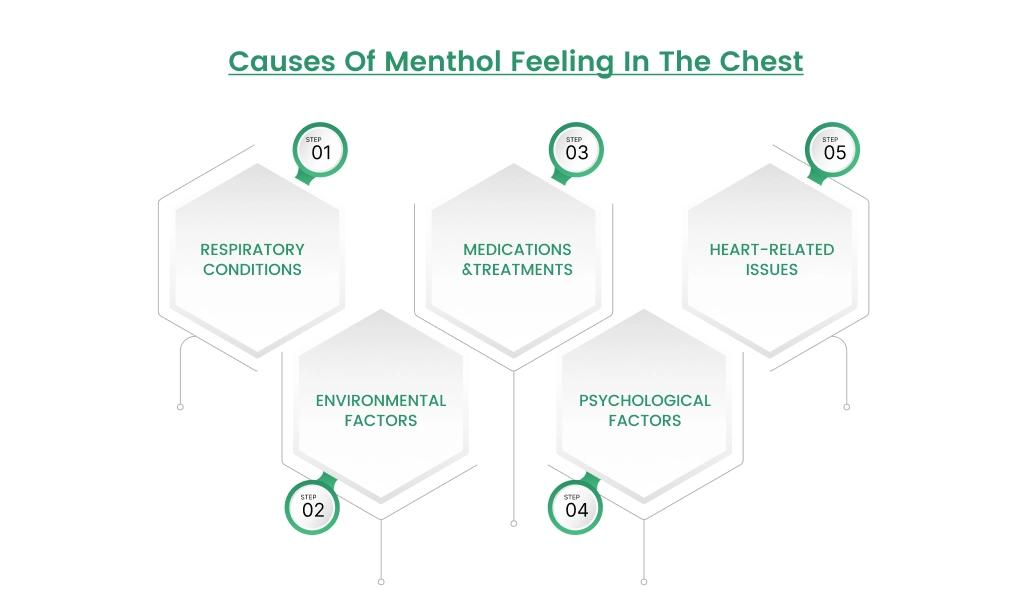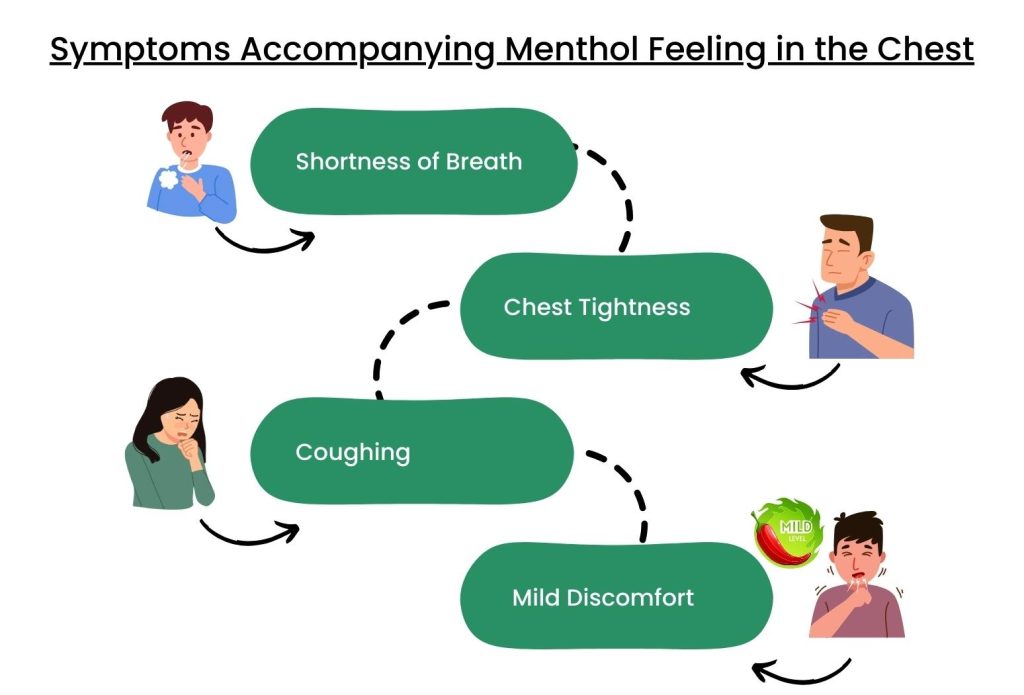Have you ever experienced a sudden cold sensation in your chest, almost like a burst of menthol that takes you by surprise? This unique feeling, often described as a menthol sensation in the chest, can be startling and leave many wondering about its cause. Whether it strikes after inhaling cold air, using a menthol-based product, or seemingly out of nowhere, understanding this sensation is crucial.
In this blog, we explore the reasons behind the menthol feeling in your chest, exploring its causes, accompanying symptoms, and when it might signal something more serious.
What is the Menthol Feeling in the Chest?
The menthol feeling in the chest is a peculiar and often bewildering sensation that many people describe as a cool, tingling, or icy wave coursing through their chest. This experience, commonly referred to as menthol feelings in chest, can occur for various reasons, ranging from the use of menthol-containing products like cough drops and inhalers to exposure to cold air.
Sometimes, it can also be linked to certain medical conditions or medications. Understanding what causes these menthol feelings in the chest is essential, as it helps differentiate between a benign sensation and a potential underlying health issue that might require attention.
Causes of Menthol Feeling in the Chest
Understanding the causes of the menthol feeling in the chest is key to addressing and managing this unusual sensation. This cooling or tingling feeling can be triggered by a variety of factors, each linked to different underlying conditions or external influences.
Respiratory Conditions: Asthma, bronchitis, and COPD can lead to a menthol feeling due to airway irritation.
Medications and Treatments: Certain inhalers, cough syrups, and other medications may produce this sensation as a side effect.
Heart-Related Issues: Conditions such as angina or heart attacks can sometimes present with a menthol-like feeling in the chest.
Environmental Factors: Exposure to cold air or the use of menthol-containing products can trigger this sensation.
Psychological Factors: Anxiety and panic attacks can cause a menthol feeling in the chest due to hyperventilation or stress responses.
Symptoms Accompanying Menthol Feeling in the Chest
Experiencing a menthol feeling in the chest, where the chest feels cold inside, can often be accompanied by other symptoms that provide important clues about the underlying cause. Recognizing these accompanying symptoms is crucial for understanding the situation better and knowing when to seek medical help.
Common Symptoms
Shortness of Breath: Many individuals report having difficulty breathing or feeling a sensation of breathlessness that accompanies the menthol feeling in the chest. This can be particularly noticeable during physical activity or even while at rest.
Chest Tightness: A common symptom that often accompanies the menthol sensation is a feeling of pressure or constriction in the chest. This tightness can vary in intensity from mild to severe and may be persistent or intermittent.
Coughing: Persistent or sporadic coughing can be another symptom that occurs alongside the menthol feeling. This coughing may be dry or productive (producing mucus) and can exacerbate the feeling of discomfort in the chest.
Mild Discomfort: Some individuals experience a general sense of discomfort or a mild burning sensation in the chest. This discomfort may be subtle but persistent, contributing to an overall sense of unease.
When to Worry
Severe Chest Pain: Intense pain that feels like a sharp, stabbing, or crushing sensation in the chest should not be ignored. This pain may also radiate to other areas of the body, such as the arm, neck, jaw, or back, and could indicate a serious heart condition like angina or a heart attack.
Dizziness or Fainting: Feeling lightheaded, dizzy, or experiencing fainting spells in conjunction with the menthol feeling in the chest can be a sign of a serious issue. These symptoms might indicate a drop in blood pressure or an arrhythmia (irregular heartbeat).
Rapid or Irregular Heartbeat: Noticing a noticeably fast, pounding, or irregular heartbeat along with the menthol sensation in the chest can be alarming. This might suggest an underlying heart condition that requires prompt evaluation.
Severe Shortness of Breath: An inability to catch your breath, severe difficulty in breathing, or a feeling of suffocation are critical symptoms that necessitate immediate medical attention. These could be signs of a respiratory or cardiac emergency.
Diagnosis and Medical Evaluation
When you experience a menthol feeling in your chest, it’s important to understand when to seek medical advice and what to expect during a medical evaluation. Proper diagnosis is crucial for determining the underlying cause and ensuring appropriate treatment.
When to See a Doctor
Persistent Symptoms: If the menthol feeling in your chest persists for more than a few days without improvement.
Accompanied by Other Symptoms: Seek medical advice if the menthol sensation is accompanied by other symptoms such as shortness of breath, chest tightness, coughing, or general discomfort.
Worrying Symptoms: Immediate medical attention is necessary if you experience severe chest pain, dizziness, fainting, rapid or irregular heartbeat, or severe shortness of breath.
Recurring Episodes: If you have recurring episodes of menthol feelings in your chest, even if they are mild, it’s important to get evaluated to rule out any serious conditions.
Diagnostic Tests
Chest X-rays: This imaging test helps visualize the lungs, heart, and chest wall to identify any abnormalities such as infections, lung diseases, or heart problems.
Spirometry: This test measures lung function and can help diagnose conditions like asthma, COPD, and other respiratory disorders.
Electrocardiogram (ECG or EKG): An ECG records the electrical activity of the heart and can detect arrhythmias, heart attacks, and other heart-related issues.
Blood Tests: These tests can help identify markers of inflammation, infection, or other conditions that might cause chest sensations.
Echocardiogram: An ultrasound of the heart that provides detailed images to assess heart function and structure.
CT Scan: A more detailed imaging test that can help diagnose conditions affecting the lungs and heart.
Treatment Options
Addressing the menthol feeling in your chest, where it may feel cold or airy, involves a combination of medical treatments, lifestyle changes, and home remedies. Proper treatment depends on identifying and managing the underlying cause of this sensation.
Medication
– Bronchodilators: Commonly prescribed for respiratory conditions such as asthma or COPD, these medications help open up the airways and reduce the menthol feeling in the chest.
– Anti-Inflammatory Drugs: These medications are used to treat inflammation in the respiratory tract, and they can alleviate symptoms associated with bronchitis or other inflammatory conditions.
– Beta-Blockers: For heart-related issues, beta-blockers can help manage symptoms by reducing heart rate and blood pressure, thus alleviating the sensation of an airy feeling in the chest.
– Antacids: If gastroesophageal reflux disease (GERD) is causing the sensation, antacids can neutralize stomach acid and reduce discomfort.
– Anxiolytics: If anxiety or panic attacks are contributing to the cold feeling in the chest, medications to manage anxiety may be prescribed.
Home Remedies
Steam Inhalation: Inhaling steam can help open up the airways and reduce the menthol feeling, especially if it’s caused by respiratory congestion.
Hydration: Drinking plenty of water keeps the respiratory tract moist and can alleviate dryness that might contribute to the sensation.
Warm Compress: Applying a warm compress to the chest can relieve discomfort and soothe the sensation of a cold chest.
Breathing Exercises: Practicing deep breathing exercises can help manage anxiety-related symptoms and improve overall lung function.
Preventive Measures
Preventing the weird menthol feeling in your chest involves taking proactive steps to maintain overall respiratory and cardiovascular health. Start by avoiding known triggers such as exposure to cold air, menthol-containing products, and allergens that can provoke this sensation.
Quitting smoking is crucial, as smoking can exacerbate respiratory issues and contribute to the development of this unusual feeling. Maintaining a balanced diet rich in nutrients and staying well-hydrated helps keep your respiratory and cardiovascular systems functioning optimally.
Regular exercise, particularly activities that enhance cardiovascular and lung health, can also reduce the likelihood of experiencing this menthol sensation. Additionally, managing stress through relaxation techniques and breathing exercises can prevent anxiety-related chest sensations.
By adopting these preventive measures, you can significantly reduce the frequency and intensity of the weird menthol feeling in your chest.
Conclusion
Experiencing a menthol feeling in your chest can be unsettling, but understanding its causes and symptoms can help you manage this unusual sensation effectively. Whether it’s due to respiratory conditions, heart issues, or anxiety, identifying the root cause is crucial for appropriate treatment. By adopting preventive measures and making necessary lifestyle changes, you can reduce the occurrence of this sensation and maintain better overall health.
If you find that the menthol feeling in your chest persists or is accompanied by more severe symptoms, seeking medical advice is essential to ensure your well-being.
FAQs
Question 1: Why do I feel a cooling sensation in my chest?
Ans: A cooling sensation in the chest, often described as a menthol feeling, can be caused by various factors including respiratory conditions like asthma or bronchitis, the use of menthol-containing products, exposure to cold air, or certain medications. It may also be linked to psychological factors such as anxiety.
Question 2: Can anxiety cause a menthol feeling in the chest?
Ans: Yes, anxiety can cause a menthol feeling in the chest. During anxiety or panic attacks, hyperventilation and stress responses can lead to various sensations, including a cooling or tingling feeling in the chest.
Question 3: Is a menthol feeling in the chest a sign of heart problems?
Ans: A menthol feeling in the chest can sometimes be associated with heart problems, such as angina or other cardiac conditions. If this sensation is accompanied by severe chest pain, dizziness, or shortness of breath, it is important to seek immediate medical attention to rule out serious heart issues.
Question 4: What home remedies can help alleviate this sensation?
Ans: To alleviate the menthol feeling in your chest, you can try steam inhalation to open up airways, stay hydrated to keep the respiratory tract moist, use a warm compress on your chest, and practice deep breathing exercises to manage anxiety. Avoiding triggers such as cold air and menthol products can also help.



